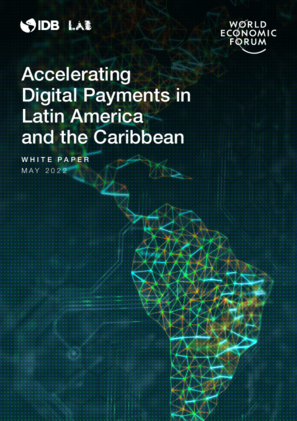Accelerating Digital Payments in Latin America and the Caribbean
Date
May 2022
Between the first and second quarters of 2020, e-commerce website traffic from five of the regions major markets increased by over 150%. The COVID-19 pandemic has pushed and pulled tens of thousands of businesses in the region to go digital. The impact and advantages of such digitalization are quite telling for small and medium-sized enterprises (SMEs) in particular. SMEs in LAC can diversify their customer base and reach 20 foreign markets when operating online, while those that operate offline can only reach from two to five. As todays digital economy becomes the norm, universal basic services such as education and medical care are also taking place online.
Digital payments are critical to enabling this transformation at both domestic and cross-border levels. But many challenges still exist that preclude the broadening of digital payment use throughout the region from a lack of access, regulatory harmonization and affordable payment solutions, to a need for further public and private sector cooperation, consumer protections and an open, inclusive and interoperable payment ecosystem.
In 2021, the World Economic Forum and the innovation laboratory of the Inter-American Development Bank, IDB Lab, jointly launched the Payments to Advance Growth for All (PAGA) initiative to address these challenges. This initiative has convened a diverse community of over 100 public and private sector representatives to explore, through dialogue, how to best unlock the true benefits of digital payments in LAC. As digital payments continue to thrive and drive financial inclusion and economic growth, we hope this paper will provide a timely snapshot of the most pressing issues and highlight the importance of public-private and private-private cooperation to advance digital payments for all in an open, inclusive and safe manner.
* The opinions expressed in this work are those of the authors and do not necessarily reflect the views of the IDB, its Board of Directors or the countries they represent, nor of the MIF (IDB Lab) Donors Committee or the countries it represents.
Digital payments are critical to enabling this transformation at both domestic and cross-border levels. But many challenges still exist that preclude the broadening of digital payment use throughout the region from a lack of access, regulatory harmonization and affordable payment solutions, to a need for further public and private sector cooperation, consumer protections and an open, inclusive and interoperable payment ecosystem.
In 2021, the World Economic Forum and the innovation laboratory of the Inter-American Development Bank, IDB Lab, jointly launched the Payments to Advance Growth for All (PAGA) initiative to address these challenges. This initiative has convened a diverse community of over 100 public and private sector representatives to explore, through dialogue, how to best unlock the true benefits of digital payments in LAC. As digital payments continue to thrive and drive financial inclusion and economic growth, we hope this paper will provide a timely snapshot of the most pressing issues and highlight the importance of public-private and private-private cooperation to advance digital payments for all in an open, inclusive and safe manner.
* The opinions expressed in this work are those of the authors and do not necessarily reflect the views of the IDB, its Board of Directors or the countries they represent, nor of the MIF (IDB Lab) Donors Committee or the countries it represents.




